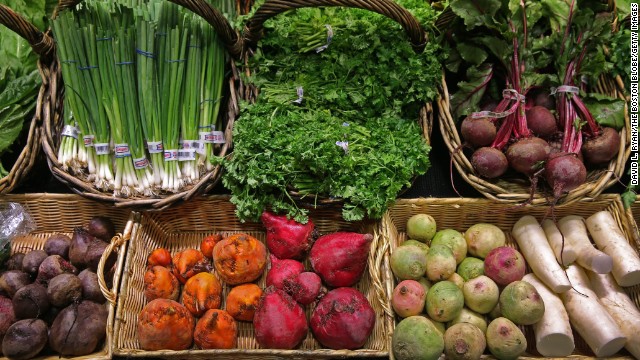Is organic food better for you?是有機食品對你更好?
- A new study says organic foods are more nutritious than conventionally grown food
- Aaron Carroll: There's little evidence that organic foods are better for people
- He says higher level of antioxidants in organic foods doesn't lead to better health
- Carroll: Organic crops are lower in protein, which is an actual nutrient
Editor's note: Aaron E. Carroll is a professor of pediatrics at the Indiana University School of Medicine and the director of its Center for Health Policy and Professionalism Research. He blogs about health policy at The Incidental Economist and tweets at@aaronecarroll. The opinions expressed in this commentary are solely those of the author.
(CNN) -- Recently, a study published in the British Journal of Nutrition said that organic fruits and vegetables are more nutritious.

A press release declared it the "largest study" of its kind. Because of its size and breadth, some people believe that it trumps previous research which showed organic food did not appear to be any safer or more nutritious than conventionally grown food.
Despite the hoopla, I think this study offers little new information and is not very convincing in making a claim that organic food is somehow "better for you."
This new study, like many before it, was a systematic review and meta-analysis. That means it wasn't a new clinical trial or report of laboratory research. It was a specific kind of analysis that allows for a "study of studies." Basically, researchers set out to find all relevant research in a field, and then combine all of it together into one big analysis.



This type of analysis allows for many smaller studies, which might not have much power, to be merged into a study that might allow for more comprehensive inspection. It also allows for research that on its own might not be robust enough to achieve some sort of statistical significance.
Systematic reviews are sometimes preferable to regular review articles because they have reproducible methods. By stipulating how scientists searched for research, how they determined what studies were good enough for inclusion, and what tests were done, systematic reviews allow others to judge the merits of the work, and to test its conclusions if desired.
Clarified: What does 'organic' mean?
But that doesn't mean that systematic reviews are infallible or immune from criticism. In fact, often the results of systematic reviews or meta-analyses can be hotly contested. I'm sure they will be for this study.
In 2009, for example, a group of scientists published amajor review of organic versus conventionally grown food, covering research from 1958 through 2008. They reviewed 52,471 articles and found 162 studies that compared crops and livestock products. They deemed 52 of them high enough quality for inclusion in their analyses. They found no significant difference between organic and conventionally grown food with respect to nutrient content.
However, this study was considered by some to be methodologically imperfect.
So in 2012, researchers from Stanford University worked on this topic and published a systematic review and meta-analysis. They looked at research through May of 2011, found 460 studies, and identified 237 that met their inclusion criteria. Of these, 17 were studies of human diets, and 223 were studies of foods themselves.
Again, the result was that there's a lack of evidence that organic foods are significantly more nutritious than conventionally grown food.
Which brings us to the most recent study. The authors of this paper acknowledged the previous reviews, but claimed that they weren't comprehensive enough. So they searched the literature from 1992 through 2011 and reviewed 448 studies. They deemed 343 appropriate for inclusion, which did make this a "larger" study.
But remember that this study didn't include much more "newer" data than the Stanford study did. It simply had more data because it was more permissive in the type of studies that it deemed of high enough quality to be included.
The analysis showed that there were a significantly higher level of antioxidants in organic foods than in conventionally grown foods. It is on this basis that the researchers declared organic food more nutritious. They also found higher levels of pesticides on conventionally grown foods, which they said made them more unsafe.
First of all, it's important to be realistic about what antioxidants can and can't do. They are a type of compound, used by our body, to fight against "free radicals" or chemicals that can cause damage to many structures in the body by stealing electrons from certain molecules. Antioxidants can "give" electrons to free radicals so they don't take from our bodies.
But antioxidants aren't "nutrients." They also aren't all the same. Each one works in a certain way in different parts of the body. More importantly, there is little evidence that more antioxidants will lead to better health.
Vitamin E has shown mixed results in the Women's Health Study, theHeart Outcomes Prevention Evaluation trial, and the GISSI-Prevenzione trial. Beta-carotene was shown to have no effect on heart disease or cancer. Mixtures of antioxidants didn't prevent cardiovascular events in women or cancer heart disease, or death in anyone. These studies all included much larger doses of antioxidants than would likely be received by eating organic fruits and vegetables.
Second, the most recent study also found that organic crops are lower in protein. That's an actual nutrient, and it's being ignored in much of the media reports.
Third, while levels of pesticides may be higher in conventionally grown food, none of the studies have detected levels of chemicals that approach anything near what would be classified as an unsafe level.
Finally, though, this study provides an opportunity to understand how we might think about systematic reviews in general. If it were so obvious that organic foods were nutritionally superior, we would need no meta-analysis. Large studies would find clear benefits with respect to nutrients, and that would be that. We are having this argument because it is hard to find a benefit.
Moreover, when a systematic review finds a benefit that an old study didn't, by being more permissive of the research it includes, that should give us pause. It's entirely possible, of course, for previous work to be flawed and to have left out critical research, but that doesn't appear to be the case here.
It seems that the recent study included everything the old study did, and then added to it research that didn't make the cut the first time. That's potentially problematic.
Of course, it's a judgment call as to which analysis is correct. I tend to favor the Stanford study, because it seems like it was more rigorous in excluding studies with weaker methodologies.
But as with many things, people's predisposed beliefs will likely color their interpretations of which study is correct. Even if you favor the newer study, the differences, while statistically significant, do not provide evidence to support the notion that organic foods are more nutritious.
I would be remiss if I neglected to mention one more thing. The Stanford study was done with no external funding at all. The newer study, though, cost $429,000 and was funded by a charity that "supports organic farming research." That doesn't mean that a conflict of interest tainted the methods or results, but it should at least be acknowledged.
是有機食品對你更好?
由亞倫·卡羅爾
2014年8月5日 - 更新1125 GMT(1925 HKT)
新聞提要
一項新的研究稱有機食物比傳統方法種植的食品營養更豐富
亞倫·卡羅爾:幾乎沒有證據表明有機食品對人們更好地
他說,在有機食品抗氧化劑的較高水平不會導致更好的健康
卡羅爾:有機作物是低的蛋白質,這是一個實際的養分
編者按:亞倫大腸桿菌卡羅爾是小兒科教授在美國印第安納大學醫學院和衛生政策中心和專業研究的主任。他的博客大約在衛生政策的附帶經濟學家在和鳴叫@aaronecarroll。表示在本評論中觀點僅為作者。
(CNN) -最近,研究發表在營養學的英國雜誌說,有機水果和蔬菜更有營養。
阿龍 - 卡羅爾
阿龍 - 卡羅爾
新聞稿宣布它的“ 大學習 “的同類。由於其規模和廣度,有些人認為它勝過以往的研究顯示,這些有機食品沒有出現任何比傳統方法種植的食品更安全或更有營養。
儘管喧鬧,我認為這項研究提供一點新的信息,是不是非常有說服力的提出索償,有機食品是某種“更好的為您服務。”
這項新的研究中,像許多之前,是一個系統的回顧和薈萃分析。這意味著它不是一個新的臨床試驗和實驗室的研究報告。這是一個特定類型的分析,允許一個“研究研究。” 基本上,研究人員開始尋找所有相關研究的領域,然後將所有的它連成一個大的分析。
引導有機飲食 知道什麼時候買有機 嬰兒新鮮,有機食品
這種分析使得許多小型研究,可能沒有多大的力量,合併成一份研究報告,可能允許更全面的檢查。它也允許研究,關於其自己的可能不是足夠穩定以實現某種統計意義。
系統評價有時最好到正規的評論文章,因為他們有可重複的方法。按規定科學家如何搜尋研究,他們是如何確定哪些研究是列入不夠好,什麼測試完成後,系統評價讓別人來判斷作品的優劣,如果需要檢驗報告的結論。
澄清:什麼是'有機'是什麼意思?
但是,這並不意味著系統評價是無誤的或批評的免疫。事實上,往往是系統評價和薈萃分析的結果可以必爭之地。我敢肯定,他們會為這項研究。
2009年,例如,一組科學家發表了重要審查有機與常規種植的食品,從1958年到2008年覆蓋研究他們回顧52471篇,發現162的研究,相比作物和畜產品。他們認為其中的52納入其分析足夠高的質量。他們發現有機和傳統方法種植的食品之間沒有顯著差異就營養成分。
不過,這項研究被認為是由一些在方法不完善。
因此,在2012年,研究人員從斯坦福大學關於這一主題的工作,並發表了系統回顧和薈萃分析。看著他們通過研究2011年5月的,發現460的研究,並確定了237能夠滿足他們的入選標準。其中,17人人類飲食的研究,以及223人的食物本身的研究。
同樣,其結果是,有一個缺乏證據證明有機食品顯著比傳統方法種植的食品營養更豐富。
這給我們帶來的最近期的一項研究。本文的作者承認以前的評論,但聲稱自己是不夠全面的。因此,他們搜查1992年的文獻中,到2011年,審查448的研究。他們認為343適合列入,這的確讓這一個“大”的研究。
但請記住,這項研究並沒有包括除斯坦福的研究做了很多更“新”的數據。它只是有更多的數據,因為它是在研究,它被認為足夠高的質量,包括類型更加寬容。
分析結果表明,有在有機食品的抗氧化劑比傳統方法種植的食品的顯著更高的水平。正是在此基礎上,研究人員宣稱有機食品更有營養。他們還發現較高水平的殺蟲劑對傳統方法種植的食品,他們說讓他們更加不安全。
首先,它必須面對現實,什麼是重要的抗氧化劑,能和不能做什麼。它們是一類化合物的,用於我們的身體,以對“打自由基 “或化學物質,可以通過從目標分子盜取電子造成損害的許多結構在體內。抗氧化劑能“給”電子自由基,使他們不從我們的身體需要。
但抗氧化劑是不“營養素”。他們也都不盡相同。每一件作品以某種方式在身體的不同部位。更重要的是,很少有證據表明,更多的抗氧化劑會導致更好的健康。
維生素E顯示混合的結果在婦女健康研究中,心臟後果預防評估試驗中,和GISSI-Prevenzione審判。的β-胡蘿蔔素被證明有任何作用於心臟疾病或癌症。抗氧化劑的混合物沒有預防心腦血管事件的婦女或癌症心臟疾病或死亡的人。這些研究都包括更大劑量的抗氧化劑比可能會通過吃有機水果和蔬菜可以接受的。
第二,最近期的研究還發現,有機作物下部的蛋白質。這是一個真正的營養,而且它被忽略了太多的媒體報導。
第三,農藥的水平可能是在傳統方法種植的食品高,沒有研究已經檢測到接近附近有什麼會被列為不安全程度的任何化學物質的水平。
最後,雖然,這項研究提供了一個機會,來了解我們如何考慮系統評價一般。如果是如此明顯,有機食品是營養價值高,我們需要沒有薈萃分析。大量的研究會發現明顯的好處就營養物質,這將是這一點。我們有這樣的說法,因為這是很難找到一個好處。
此外,當一個系統的回顧發現一個好處就是一個老的研究都沒有,通過更寬容的,它包括了研究,認為應該給我們暫停一下。這是完全有可能的,當然,對於以前的工作是有缺陷的,並給我們留下了重要的研究,但不會出現在這裡的情況。
看來,近期研究包括一切舊的研究做了,然後添加到它的研究未獲得晉級的第一次。這是潛在的問題。
當然,這是一個主觀判斷哪個分析是正確的。我傾向於贊成斯坦福大學的研究,因為它看起來就像是在排除研究與弱的方法更加嚴格。
但是,對於很多事情,人們的易感信仰可能會上色他們解釋其中的研究是正確的。即使你喜歡較新的研究中,分歧,而統計學顯著,不提供證據來支持這一概念的有機食品更有營養。
我是失職,如果我忘了提一件事。斯坦福大學的研究是在沒有外部資金的。在新的研究中,雖然成本429000美元,並資助了一個慈善機構“支持有機農業的研究。” 這並不意味著利益衝突玷污了方法或結果,但它至少應該得到承認。




 留言列表
留言列表
 {{ article.title }}
{{ article.title }}

